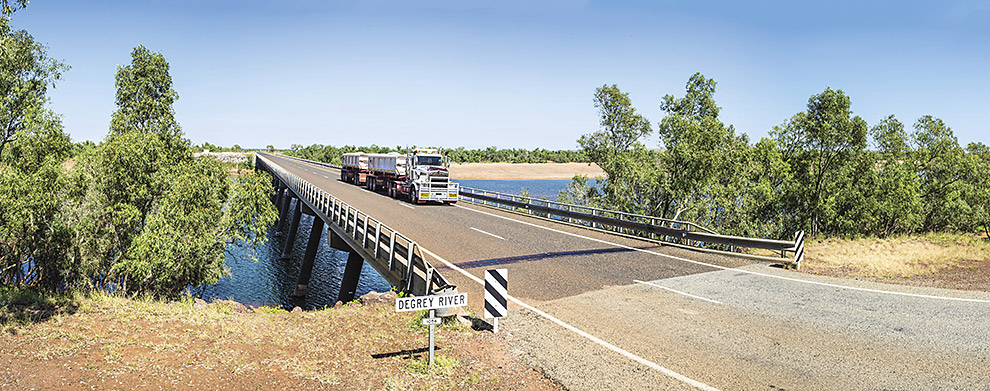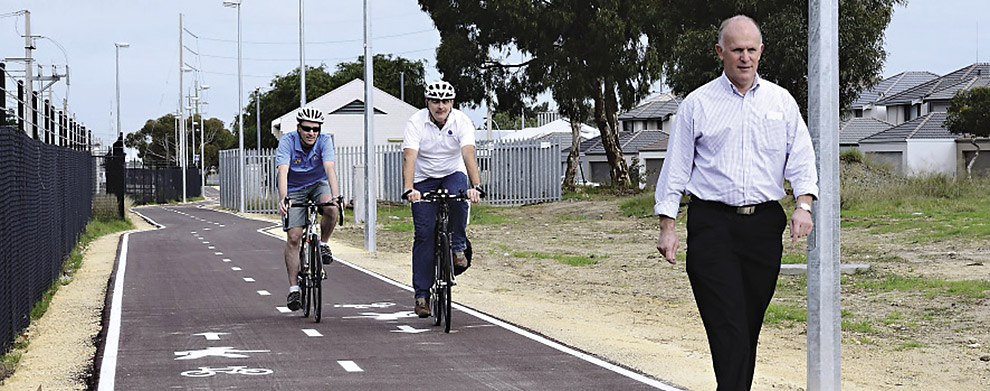
Challenges and Opportunities
The transport system is an integral part of the everyday lives of all Western Australians and in a State that is as large and diverse as ours, it is a critical component of the lifeblood that makes it all work. The vast distances and sparse population present complex challenges for productivity and sustained prosperity. Whether it is continuing to strengthen our economic success, assisting in improving the quality of life for all or seeking to create a strong foundation for those that come after us, the State road network has a vital role to play.
In seeking to meet community expectations and deliver government outcomes there will always be challenges to overcome and opportunities to recognise and benefit from. The following provides a snapshot of some of these challenges and opportunities and looks at what we might be facing in the future.
Economic
Western Australia exports 46% of the nation’s total exports, up some 20% in the last decade, and at some point roads play a part in the supply chain. Whilst much of those exports are represented by bulk movement of freight we also need to be mindful that close to 70% of all freight is actually distributed throughout the metropolitan area by light commercial vehicles.
At Main Roads, we need to ensure that we continue to be well placed in order to achieve the delivery of more than $8 billion in services over the next four years including, $3.4 billion of capital works and distributing $809 million in grants to Local Government. With our Portfolio Partners, Local Government and other agencies we will be working to deliver a range of significant major projects across the State that will not only address exports and freight, but also contribute to improved productivity as we tackle the impacts of congestion.
Whilst major capital projects form a large part of the budget, it is imperative that we achieve the best value and outcomes from the equally important smaller initiatives. In the changing legislative environment we are monitoring the proposed approaches to carbon pricing. However, we believe that the economic impact on our operations will be minimal.
Social
At almost twice the pace of the national average, Western Australia’s population increased by 3.5% over the 2012 calendar year and during December alone we had 1,432 new people arriving each week. The latest projections show that our population could increase to possibly 5.4 million by 2056. Furthermore, Perth is forecast to become home to over 75% of the State’s population by 2050. Our task is to serve the needs of a growing population while addressing the impacts this will have on meeting the land use and access needs of individuals, the community and business. Responding to this potentially significant change in our urban environment and meeting the new and additional needs of road users is an emergent challenge.
The State’s vehicle fleet continues to grow at the fastest rate in Australia and in Perth almost 80% of people travel to work by car with only 12% using public transport. Given that 80% of public transport operates on the road network, we have a key role to play within the Transport Portfolio as we aspire to create safe, sustainable transport for the community.
We have a clear and important responsibility in contributing to the solutions that will address these growing concerns. It will be a great challenge to provide services that will enable the community to make more informed travel decisions while also achieving better integration of transport modes to improve productivity, efficiency and safety. We will continue to enable and promote a transport system that supports shared access including walking, cycling, public transport and use of all forms of vehicles.
Environmental
Our natural environment is a valuable asset that is subject to many pressures, including the loss and degradation of native vegetation which is seen as a long-term issue. While developing and managing an extensive road network can create such pressures, this also provides opportunities to make gains in biodiversity, the efficient use of natural resources and reductions in carbon-based emissions. In addressing these challenges, a key focus will be on continuing the development of our people to be more effective in fulfilling their environmental responsibilities. We will be driving more consistent outcomes in land rehabilitation, roadside habitat preservation, and reducing carbon emissions across our business.
In terms of climate change, we are looking to manage the road asset and its use in a way that reduces the contributions that transport makes to carbon emissions and the impact that has on communities, the economy and the environment. Climate change is predicted to have a significant impact on transportation, affecting the way we plan, design, construct, operate and maintain our infrastructure. Decisions taken today related to the redesign and retrofitting of existing infrastructure, or the location and design of new infrastructure, will affect how well our network is able to adapt to climate change into the future.

Looking Ahead
This next year will see the launch of our new Strategic Plan looking out to 2020 and once again we have decided to build our approach on the highly successful scenario-based planning methodology we used in the development of the 2k12 Strategic Plan. One of the new areas of focus is around Creating Value and all of the implications, financial and non-financial, that might encompass. To that end we have begun considering and exploring concepts associated with Social Return on Investment and Natural Capital Approaches to valuing goods and services to open up new ways of thinking about looking at value as more than just money. In the same way that a business plan contains more than just financial projections this new thinking is about exploring changes to the concepts that decisions are made based on their value.
As part of meeting the challenge of embedding sustainable practices into our core business processes we have adopted the Infrastructure Sustainability Council of Australia IS rating tool for all projects greater than $100 million. This approach is already driving a culture of change that we will build on across all our initiatives under the Transport portfolio.
Whilst taking into account all challenges and opportunities ahead, we will work with our stakeholders and partners to deliver integrated transport solutions, better road services, and an improved travel experience for all Western Australians.


